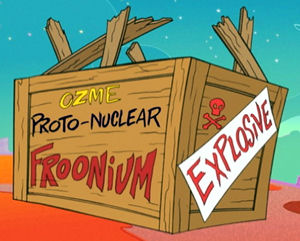
Science quiz! Which of these is the least scientifically plausible?
- An alien species can project heat rays that can fry humans dead… or serve as a powerful truth serum.
- A society has developed a liquid “litmus test”: just dab a drop on your lips and kiss someone. If the kiss tastes sweet, your DNA is compatible for having healthy children.
- They’ve also got technology that can turn people into metallic statues… and back again. While you’re a statue, you remain fully conscious, you can see and hear just fine, and you don’t age. If your statue’s head is lasered off, it can be reattached with no ill effects.
- A human wearing no protective gear jumps out of a spaceship in orbit, spends a minute in vacuum… and survives.
If you answered #4, you’re not alone… but you’re incorrect. All the above are from Farscape‘s “Look at the Princess” trilogy of episodes, to which a lot of viewers reacted “No way! That just couldn’t happen!” And they weren’t talking about #1 or #2 or #3… few even blinked at those. No, it was #4 that got people flustered.
(Well, okay, some of our fans were far more perturbed that our hero had sex with someone other than our heroine… but that’s a different discussion entirely.)
Everybody “knows” you can’t survive in outer space. But as it happens, #4 was one time – possibly the only time – that Farscape got its science more or less right. Humans exposed to vacuum do not promptly blow up like balloons and explode. Their eyeballs don’t pop, their blood doesn’t boil, nor do they instantly freeze solid. In fact, according to NASA, if you don’t try to hold your breath, half a minute or so of vacuum exposure won’t damage you permanently.
(EDITED TO ADD: Slate‘s “Bad Astronomy” blogger Phil Plait also covered this topic… and check out these amazing drawings by Nathan Hoste of what doesn’t happen to “Bodies in Space”!)
So why could viewers accept “truth rays” and living statues and DNA kiss tests, but not a suitless space walk? Because what’s true is rarely what’s believable.
Mirror, Mirror
It’s often said that “art holds up a mirror to life.” Well, if it’s a mirror, it’s a distorted funhouse mirror, designed not for accurate reflections but for caricature, exaggeration, and analogy. And one big difference between art and life is that art has to make sense.
In a way, art has to be “more realistic” than real life. To borrow William Goldman’s example (from his book Adventures in the Screen Trade): Let’s say you’re writing a story in which Nick, your square-jawed hero, must have a private talk with the Queen of England, and the only way Nick can do that is to sneak into Buckingham Palace at night and find the Queen alone. How would you plot it?
- Nick, in a high-tech radar-invisible ninja suit, hang-glides onto the palace roof undetected, then silently renders the guards unconscious with tranquilizer darts or karate chops. Nick must then circumvent a corridor crisscrossed with laser beams by crawling on the ceiling like Spider-Man or by contorting his body through the gaps or by diverting the beams with mirrors… etc.
- Nick follows Sir Smedley, a member of the royal staff, to his local pub. Nick picks Smedley’s pocket for his security pass, dons a latex face mask to disguise himself as Smedley, and… etc.
- Nick assembles a crack team. The Teenage Hacker disables the security system. The Hot Blonde puts the moves on the palace’s security chief to distract him. The Crazy Demolitions Expert blasts a tunnel into the palace basement so Nick can… etc.
- Nick, in jeans and dirty T-shirt, climbs over the barbed-wired outer walls, strolls around the palace, and enters through an open window. But the inner door’s locked, so he goes back out and keeps walking. This triggers two alarms – but Security assumes they’re both malfunctions and does nothing. Nick climbs a drainpipe, cuts through an empty office, and wanders the palace halls. There’s a man posted outside the Queen’s bedroom… but at the moment, he’s off walking the Queen’s dogs, so Nick walks right in. The Queen awakes and tries to summon the palace police with her bedside phone. The operator passes on the message, but the police don’t respond. Nick chats with the Queen for ten minutes before a chambermaid enters, sees Nick, and summons help…
I highly doubt you’d choose #4 for fear your readers would pelt you with fruit. Who’d believe it? Yet #4 is exactly what happened on July 9, 1982, when 31-year-old Michael Fagan walked unchallenged into the bedroom of Queen Elizabeth II.
That’s Incredible
Storytelling demands credibility, not truth. We don’t expect fiction to be true; we accept that it takes place in “parallel universes” (hey, kind of like Sliders)… worlds that resemble our own, but aren’t. In so-called “mainstream” fiction, the parallel universe often isn’t all that different from ours… the only changes from “our” Earth might be the specific characters and events the author’s invented.
In science fiction, however, some of the universe’s underlying rules get changed. It’s arguably a defining characteristic of science fiction that it deals with “what would happen if” the rules were different. What if we could travel faster than light and encounter alien lifeforms? What if we could journey into the past or turn invisible or communicate telepathically?
If we change too many of the rules too drastically, we leave science fiction and enter the realm of fantasy. What if magic worked? What if dragons or sorcerers or faeries or unicorns existed?
Or, for that matter, Hobbits? Nobody mistook the Lord of the Rings films for documentaries, but they cleaned up at the box office. Tolkien’s world wasn’t “true”… but it was, for storytelling purposes, believable. It felt real.
What makes even a magical fantasy universe believable? Part of the answer is logical consistency. It’s usually not the altered rules we have difficulty buying; it’s the exceptions to those rules.
As example, I’ll make up a story about Superman. We already know the rules of the Superman universe, right? He’s a nearly invulnerable alien being, but the radiation of a substance called Kryptonite is deadly to him. Well, in my story, Superman chases a bad guy who pulls out a huge chunk of Kryptonite. But the Kryptonite has no effect whatever, so Superman jails the bad guy. The end.
You’re shouting at me, aren’t you? “Whaddya mean, the end? Why didn’t the Kryptonite work? You have to explain that!” And you’re absolutely right. If I expect you to like my Superman story, I do need to explain… not the rules, but the exception.
Moreover, the explanation should feel consistent with the universe, and not just something I pulled out of my, uh, hat to get out of a jam. “Well, it’s also been established that lead blocks Kryptonite’s harmful rays, so I’ll simply explain that Supes covered himself with a lead-based ‘sunscreen’… and then in my next story, when I need Kryptonite to be deadly again, I’ll explain that the villain’s now using hyper-enhanced, Froonium-enriched Kryptonite that can penetrate Superman’s sunscreen…” (And I’ll bet you’ll have tuned me out by then.)
Of course, one viewer’s handwave (“It doesn’t quite make sense, but I’ll let it pass”) is another viewer’s fanwank (“no, it works fine if you just assume facts X and Y and Z which the writers didn’t bother to tell us”)… and yet another’s “Teenage vampires? Jeez, can’t we watch something real, like wrestling?” We all have different thresholds of disbelief-suspension, often depending how much we do know about the “real” rules. Cops, for instance, find CSI hilarious. Doctors guffaw at House and ER. And defense lawyers still explain how courtrooms actually work to prospective jurors, because too many of them expect the defense to not only prove the defendant’s innocence but also to expose the actual guilty party like Perry Mason always did.
For this is a danger of fiction: that people get so familiar with its altered rules and dramatic conventions that they mistake them for truth. If you thought a human would instantly explode/freeze/perish in vacuum, it’s probably because you’ve seen it happen that way in far too many movies and tv shows. (An exception for 2001: A Space Odyssey; they got the man-in-vacuum scene right.)
Drama can be entertaining, uplifting, cathartic, and inspiring. But educational? Put it this way: anything you “learn” from fiction demands a second opinion. Don’t get your daily fruit and fiber from jelly doughnuts… don’t take financial-planning advice from lottery commercials… and don’t get your science from science fiction. As the liquor advertisements always say: “Please enjoy our product responsibly.”

Followed your trail from Twitter.
(Well, okay, some of our fans were far more perturbed that our hero had sex with someone other than our heroine… but that’s a different discussion entirely.)
I actually found that pretty funny, the fans getting upset over that rather than the action itself. Considering the heroine had at that point shut the hero down pretty hard, I can’t say I blame him.
As for your Superman story, ever hear of red Kryptonite? It was used in the old tv show, Lois & Clark and didn’t affect Superman in the way that green Kryptonite did. He could still catch bad guys if they had red, but I think it turned him sorta evil or at least mean.
As for the rest of your lovely essay, right on. In a way drama is educational…in that some folks might actually go “Wait a minute…how can that be true?” and run off to investigate if it actually is true or not. Or investigate how right the writers got it, or not.
I grew up reading Superman comics back in the “Silver Age” when they just loved devising new colors of Kryptonite! Green (or “Classic”) K = slow death. Gold K = permanently erase Superman’s powers. Red K = any random weird/cool effect the writers wanted! It was an Instant Story Generator! Evil Superman, insect Superman, fire-breathing Superman, you name it.
I would hope that folks would indeed use drama as a springboard of sorts to go learn more about how things actually work… just as I’d also hope that folks would be equally inquiring/skeptical about claims made by commercials. ‘Course, if they did, all of ad-supported television would probably collapse…
Ooops, I may have some serious mental issues, but #4 for Nick is exactly the scenario offered that I would have gone for.
Go for it, and enjoy the fruit!
I would have chosen #4,but I knew that it had actually happened. In fiction, a writer may craft an elaborate series of parameters to explain the plot. The killers almost always wanted to get: the wife, the priceless diamond, the gazillion dollar insurance payment, etc. Real life can tend to be more simple(this was actually covered in a “Dragnet” episode from the 1950s that featured Lee Marvin). In much of TV fiction, the procedures are shortened, medical results come in before the commercial, the police catch the bad guy before the end of the episode(unless its the end of season cliffhanger). This makes sense due to time constraints, but peolpe sometimes forget that almost ALL TV is for entertainment. Its not a usually a documentary. Even “Reality” shows are not real. “Survivor” is about as real as “Gilligan’s Island”(Weird tangent: why could the Professor build a MRI machine from coconuts, but he couldn’t fix the frelling boat?).
It’s been suggested, and I’m not sure I disagree, that television is more “dangerous” when it claims to be factual than when it’s clearly fictional — because, indeed, “reality” shows aren’t.
I work as a security consultant and can attest to the regular effectiveness of #4. Trying to go somewhere you shouldn’t? Just walk right in. 90% of the time I’m never stopped, challenged or questioned.